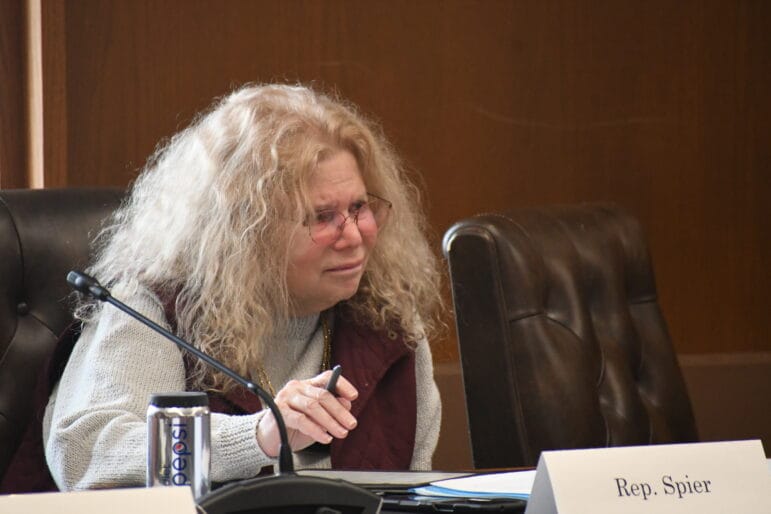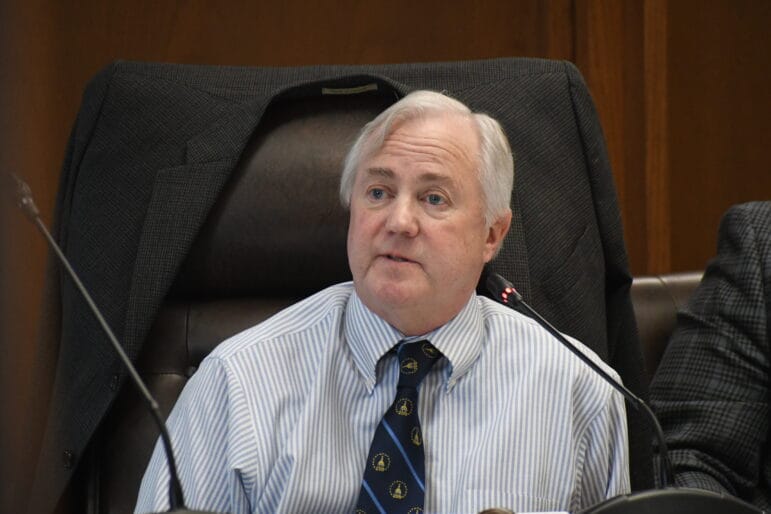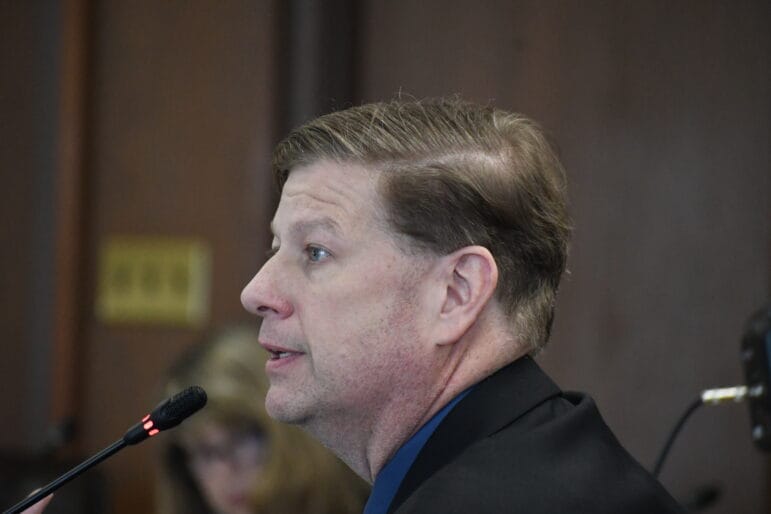Cannabis bill advances with paraphernalia amendment
The New Hampshire House of Representatives Committee on Commerce and Consumer Affairs met on Wednesday, here’s a recap of what went down.
The New Hampshire House of Representatives Committee on Commerce and Consumer Affairs met on Wednesday, here’s a recap of what went down.

This bill, named in honor of Elizabeth Croke, seeks to expand penalties for businesses serving liquor to those who are already clearly intoxicated.
If passed, businesses would be fined $7,500 and lose their license for up to 30 days, although the committee discussed a possible amendment that would split the penalty into up to $5,000 and 10 days for a first offense and $7,500 and 15 days for a second offense, or 30 days on a second offense if the business did not undertake training on proper alcohol serving practices.
The committee discussed different fine amounts and also a possible third offense which would be permanent revocation of serving privileges, although there was discussion that more severe penalties should be issued for a second offense happening soon after a first offense since that situation is so rare.
Current law does not specify penalties, with penalties coming from administrative rules that allow the New Hampshire Liquor Commission to investigate mitigating facts with each incident.
Carry Spier (D-Nashua) expressed concern over individuals who may have brought off-site alcohol into a premises but make it seem like the establishment served them, but it was indicated that there is an extensive investigation and hearing process where these facts could be discovered before revocation of serving privileges.
Kenneth Vincent (D-Somersworth) felt that the additional penalties helped keep patrons and the public safe. John Potucek (R-Derry), who said he has been a bartender since the 1960s, said that proper training and stricter penalties would also lower insurance premiums for restaurants.
Mike Somers of the New Hampshire Lodging and Restaurant Association said that 10 day revocations could put some restaurants out of business, and also noted that it does not stop restaurants from serving food.
Paul Terry (R-Alton) said that the penalties did not go far enough, saying that the public is likely to look down upon a person losing their life in a drunk driving incident as equal to a restaurant losing their right to serve liquor for 30 days. Lili Walsh (R-Hampstead) said that she prefers removing “wiggle room” from the penalties that allow lose of liquor service “up to” a certain time frame.
John Hunt (R-Rindge) said that he preferred incremental penalties and requested that the bill be retained until the fall given that the New Hampshire Liquor Commission is reviewing its rules this summer.
Online testimony at the time of the public hearing had three people in support of the bill and three opposed.

This bill restricts the use of perfluoroalkyl and polyfluoroalkyl substances, also known as PFAS, in substances in rub and carpet cleaning products.
Hunt made a motion to retain this bill as well. He referenced a bill several years ago regarding bovine growth hormone in milk that would have banned that substance but instead was pulled once milk producers agreed to put labeling on their packaging letting consumers know if it contained bovine growth hormone.
Jared Sullivan (D-Bethlehem) said that this situation is different since PFAS can leak into municipal water supplies and impact those who did not directly purchase a product with PFAS and Spier noted that the Environmental Protection Agency has indicated that PFAS causes cancer.
Anita Burroughs (D-Glen) and Hunt then engaged in a discussion on retention of the bill for future study. Burroughs said that the bill was important enough that it should move forward, but Hunt hoped that additional work could be made to make the bill more bi-partisan so it could avoid becoming a tense debate on the house floor and instead pass the house, senate and get gubernatorial approval.
After two subcommittee votes, the bill was retained.
As of Wednesday, online testimony included 75 people in support of the bill and one opposed and one neutral.

This bill creates a mechanism to regulate cannabis in a manner comparable to alcohol, with sponsorship from House Majority Leader Jason Osborne (R-Auburn) and House Minority Leader Matt Wilhelm (D-Manchester).
There were concerns from Osborne and others over lack of participation in licensing boards by industry experts. Hunt believed it was best to limit licensure processes as much as possible to avoid a situation similar to liquor licenses in Massachusetts, where a limited number of licenses are allowed, but that number must be continually updated by the legislature due to changes in demand. He added that limiting licensure rather than leaving it open to any business capable of following state regulations is tantamount to picking winners and losers and is not the New Hampshire way.
Meryl Gibbs (D-Concord) asked why the bill included caps in the amount of cannabis that could be purchased under the law, with Hunt saying that was a political compromise.
Vincent asked how this bill impacted possession, sale and usage of cannabis, receiving the answer that this bill focuses only on allowing municipalities to regulate sales, and they can already regulate the usage of certain items such as alcohol or tobacco in certain areas and this bill does not impact any laws relating to the possession of cannabis.
There was also concern regarding wording related to cannabis-related paraphernalia in the bill, with Osborne and others asking if a license would be needed if someone sold the paraphernalia and not the cannabis itself.
Currently businesses that sell paraphernalia that could be used for cannabis purposes but is marketed for tobacco purposes must obtain licenses to sell tobacco, and businesses with those licenses would be grandfathered in to sell the same paraphernalia for cannabis-related purposes.
This ambiguity was unacceptable for Osborne, at one point holding up a pen cap and expanding on his reasoning, inferring that under this bill a license would be needed to sell that pen since it could theoretically be used for cannabis-related purposes.
The committee voted 17-3 that the bill ought to pass, with Terry, Walsh and Susan Porcelli (R-Hampton Falls) voting against the recommendation. There will be no minority report and the bill was not placed on the house’s consent calendar.
The only tax related to the bill is a 5 percent tax on cultivators, differing from cannabis-related tax structures in other states.
Online testimony as of Wednesday included 112 people in favor of the bill, 43 opposed and one neutral.
This bill would prohibit balance billing by ambulance services. The committee voted 20-0 to retain the bill.
This bill’s online testimony had 13 people in support, one opposed and no neutrals.

This bill addresses the issue of white bagging and brown bagging regarding medications provided to patients.
Tim McGough (R-Merrimack) expressed concern with the practice of “brown bagging,” where third-party organizations send medications directly to patients through delivery services. McGough said this practice should be avoided at all cost, given the possibility of those medications being delayed or damaged in transit.
He also expressed concern with “white bagging,” or the practice of third-party organizations sending medications directly to clinicians to administer to patients, stating concerns that they are being charged through insurance companies as medical expenses rather than pharmaceutical expenses, leading to astronomical costs such as a $600 bill for aspirin.
Representatives from hospital and pharmaceutical organizations said that New Hampshire hospitals do not use brown bagging due to safety concerns and try to avoid white bagging whenever possible, instead focusing on on-site pharmaceutical services whenever possible.
They expressed this bill does not go far enough toward fighting the practice of brown bagging and could complicate efforts to fight it.
Lisa Post (R-Lyndeborough) asked if there was any data regarding adverse outcomes related to brown bagging or white bagging and was told by the hospital representatives that hospitals only keep voluntary data on the topic, which the did not provide during the hearing.
Insurance company representatives called the hospital spokesperson comments as a red herring and said that brown bagging and white bagging is a valuable tool to help patients obtain medication.
This bill aims to protect consumers from unexpected problems related to sensor malfunctions that may arise after windshield replacements by telling consumers recalibration of those sensors may be needed after a windshield replacement.
McHugh, the sponsor of this bill, discovered when he had a windshield replacement that there are many complicated safety sensors connected to modern-day windshields and felt concerned that some windshield replacement companies may not advise consumers of this fact and improperly
Terry asked if there were any instances of this happening to unwitting customers. McHugh could not, but said that other states have addressed this issue.
Spier said that most car manuals advise drivers to get sensors recalibrated after windshield replacements, with McHugh stating that most drivers don’t read the manual.
Representatives from windshield glass manufacturers say that this initiative is a safety measure and it would help protect consumers against unscrupulous repair agencies.
This bill had one person in support online and two opposed as of Wednesday.




